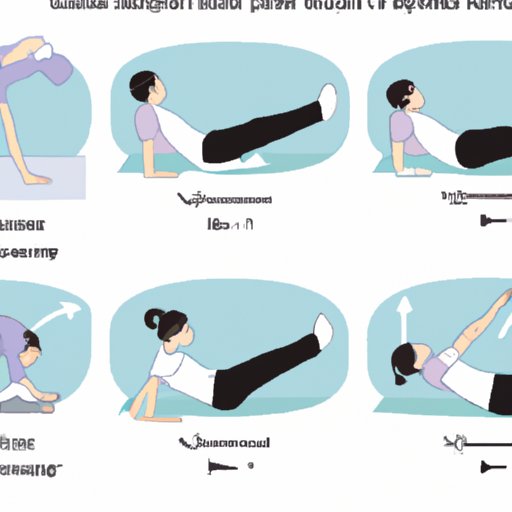Introduction
Good digestive health is essential to overall wellbeing. From nutrient absorption to waste elimination, the digestive system plays a vital role in maintaining general health. As such, it is important to understand how different lifestyle factors, including exercise, may affect your digestive system.
This article will explore the relationship between exercise and digestion. We will look at the physiological changes that occur in the body during exercise and the role of exercise in stimulating digestive processes. Then, we will dive into the potential benefits of exercise on digestive health as well as any possible complications associated with too much exercise.
Finally, we will examine the evidence to determine whether or not exercise actually helps digestion, as well as the role of exercise in supporting good digestive health.

A Scientific Look at How Exercise Impacts Digestion
When you exercise, your body goes through a series of physiological changes. Your heart rate increases, your breathing rate increases, and your muscles get more oxygen and nutrients. These physiological changes can also affect your digestive system.
One of the most notable effects of exercise is an increase in blood flow to the digestive organs. This increased blood flow helps to stimulate digestive processes and can help to improve digestion.
In addition, exercise can also stimulate the release of hormones that are involved in digestion. For example, exercise can stimulate the release of cholecystokinin (CCK), which is a hormone that helps to regulate appetite and digestion. Exercise can also stimulate the release of glucagon-like peptide 1 (GLP-1), which helps to slow down the emptying of the stomach and can help to reduce feelings of hunger.
An In-depth Analysis of the Relationship between Exercise and Improved Digestion
Regular exercise has been linked to improved digestive health, but it is important to consider both the potential benefits and possible complications associated with too much exercise.
Benefits of Regular Exercise on Digestive Health
Regular physical activity has been linked to several benefits for digestive health, including improved nutrient absorption, increased motility, and reduced risk of constipation.
Improved Nutrient Absorption
Exercise can help to improve nutrient absorption by increasing blood flow to the digestive organs. This can help to ensure that the body is able to absorb all of the nutrients from food and use them effectively.
Increased Motility
Regular physical activity can also help to stimulate the movement of food through the digestive tract. This can help to reduce the risk of indigestion and other digestive issues caused by slow digestion.
Reduced Risk of Constipation
Exercise can also help to reduce the risk of constipation. Physical activity stimulates the movement of muscle fibers in the digestive organs, which can help to move food through the digestive tract more quickly and prevent constipation.
Potential Complications of Too Much Exercise
While regular exercise can help to improve digestive health, it is important to note that too much exercise can have negative effects on the digestive system. Excessive exercise can lead to dehydration, which can impede digestion and cause constipation.
In addition, overtraining can put additional stress on the body, which can lead to fatigue and digestive distress. It is important to listen to your body and be aware of any signs of overtraining or excessive stress.

Exploring the Benefits of Exercise on Digestive Health
Now that we have discussed the potential benefits and complications of exercise on digestive health, let’s take a closer look at what types of exercises can do to improve your digestive system.
Aerobic Exercise
Aerobic exercise is any type of exercise that increases your heart rate and breathing rate. Examples of aerobic exercise include running, cycling, swimming, and walking. Aerobic exercise can help to improve digestion by increasing blood flow to the digestive organs and stimulating the release of hormones involved in digestion.
Strength Training
Strength training is any type of exercise that uses resistance to strengthen and build muscle. Examples of strength training exercises include weightlifting, bodyweight exercises, and resistance band exercises. Strength training can help to improve digestion by stimulating the movement of muscles in the digestive tract and increasing blood flow to the digestive organs.
Stretching and Yoga
Stretching and yoga are forms of exercise that involve stretching and holding postures to improve flexibility and core strength. These types of exercises can help to improve digestion by increasing blood flow to the digestive organs and stimulating the movement of muscles in the digestive tract.
How to Use Exercise to Boost Your Digestive Health
If you want to use exercise to improve your digestive health, it is important to follow some basic guidelines. Here are some tips to help you get started:
Getting Started
When starting a new exercise routine, it is important to start slowly and gradually increase the intensity and duration of your workouts. This will help you to avoid injury and give your body time to adjust to the new demands.
Intensity and Duration
It is important to find a balance between intensity and duration when it comes to exercise. You should aim to exercise at a moderate intensity for 30 minutes, 3-5 times a week. However, if you are just getting started, you may want to start with shorter, lower intensity workouts and gradually work up to longer and more intense workouts.
Rest Days
It is important to give your body time to rest and recover between workouts. Aim to take at least one rest day per week. During rest days, you can do gentle stretching or yoga to help keep your muscles loose and flexible.
Examining the Evidence: Does Exercise Help Digestion?
Now that we have explored the potential benefits of exercise on digestive health, let’s take a look at the evidence. Several studies have looked at the relationship between exercise and digestive health, and the results have been mixed.
Studies Showing a Positive Impact on Digestion
Some studies have found that exercise can have a positive effect on digestion. One study found that individuals who exercised regularly had better overall digestive function than those who did not exercise. Another study found that individuals who increased their physical activity levels experienced improvements in digestive symptoms such as abdominal pain, bloating, and constipation.
Studies Showing No Significant Difference
However, not all studies have found a significant benefit of exercise on digestion. One study found that there was no significant difference in digestive symptoms between individuals who exercised regularly and those who did not. Another study found that while exercise could improve digestive symptoms, it was not as effective as dietary modifications.

The Role of Exercise in Supporting Good Digestive Health
Although the evidence is mixed, it is clear that exercise can play a role in supporting good digestive health. In addition to improving digestion, regular physical activity can also help to maintain a healthy weight, improve mood and stress levels, and reduce inflammation.
Maintaining a Healthy Weight
Regular physical activity can help to maintain a healthy weight by burning calories and increasing metabolism. Keeping a healthy weight can help to reduce the risk of digestive issues such as acid reflux and irritable bowel syndrome.
Improving Mood and Stress Levels
Exercise can also help to improve mood and reduce stress levels. Stress can have a negative effect on digestion, so reducing stress levels can help to improve digestive health.
Reducing Inflammation
Finally, regular physical activity can help to reduce inflammation throughout the body. This can help to reduce the risk of digestive diseases such as Crohn’s disease and ulcerative colitis.
Conclusion
In conclusion, exercise can have a positive impact on digestion. Regular physical activity can help to improve nutrient absorption, increase motility, and reduce the risk of constipation. However, it is important to be aware of the potential complications of too much exercise, such as dehydration and overtraining.
The evidence is mixed when it comes to the specific benefits of exercise on digestion, but it is clear that exercise can play a role in supporting good digestive health. Regular physical activity can help to maintain a healthy weight, improve mood and stress levels, and reduce inflammation.
So, does exercise help digestion? The answer is yes! With proper guidance and moderation, exercise can be a powerful tool for improving digestion and overall health.
(Note: Is this article not meeting your expectations? Do you have knowledge or insights to share? Unlock new opportunities and expand your reach by joining our authors team. Click Registration to join us and share your expertise with our readers.)
